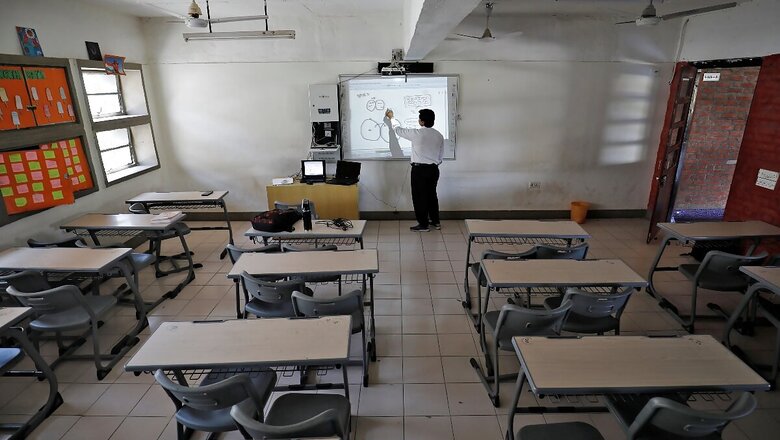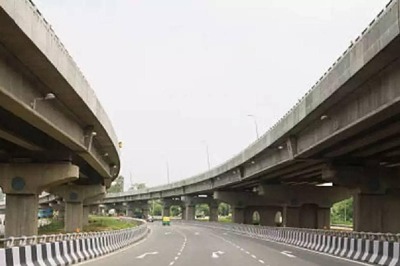
views
After 34 years, the country has got a new, futuristic, indigenous, digital and inclusive education policy.
Immediately after the change of guard at the Centre in 2014, the government announced it will come up with a New Education Policy later termed as the National Education Policy. The government, led by Prime Minister Narendra Modi, was keen to bring about a transformational change in the education sector. This was primarily needed because the previous education policy, almost 34 years old, was not catering to the needs of the youth of the country. The youth of the country is looking forward to more application-based, job-oriented and skill-based education together with an option to pursue their hobbies and talent. Hence, a comprehensive policy document was the need of the hour.
K Kasturirangan Committee, which was set up by the Ministry of Human Resource Development (MHRD), did a massive stakeholder consultation drive across the length and breadth of the country before finalising the draft document. The draft was put in public domain inviting comments and suggestions. It received feedback in abundance. After going through all the comments and incorporating the useful feedback, the union cabinet gave its nod to the final draft of National Education Policy on Wednesday.
The policy envisions pathbreaking changes both at the school as well as the higher education rank. To start with, terminologies like Extra Curricular and Co-Curricular will now be a thing of the past. Students, right from their childhood, will be given an opportunity to pursue their interests and get marks for the same. Sports, cultural activities, creativity, scientific temper, mathematical logic, coding, sense of aesthetics, art, oral and written communication, digital literacy, problem solving will now be a part of syllabus and students would have an option to choose among them as per their liking.
To infuse values and responsibilities, students will be taught subjects like Holistic Health, Organic Living, Environmental Education, Global Citizenship Education, etc. The curriculum has been reduced to enhance essential learning and critical thinking. Efforts will be made to inculcate experience-based learning among students to make them ready for their future. At the school level, “no parallel changes to physical infrastructure will be required”. The NEP suggests a change in the structure and pedagogy of the education imparted. The changes have been distributed in four stages.
Foundational Stage (in two parts, that is, 3 years of Anganwadi/pre-school + 2 years in primary school in Grades 1-2; both together covering ages 3-8): with flexible, multilevel, play/activity-based learning and the curriculum.
Preparatory Stage (Grades 3-5, covering ages 8-11): with the introduction Experiential learning across the sciences, mathematics, arts, social sciences, and humanities.
Middle Stage (Grades 6-8, covering ages 11-14): with a subject-oriented pedagogical and curricular style.
Secondary Stage (Grades 9-12 in two phases, i.e., 9 and 10 in the first and 11 and 12 in the second, covering ages 14-18) : with greater depth, greater critical thinking, greater attention to life aspirations, and greater flexibility and student choice of subjects, and option to exit at grade 10 and re-enter at a later stage in grade 11.
A significant number of buoyant changes have been introduced in the higher education. An Academic Bank of Credit (ABC) will be earmarked for all the students through an opening of a unique Digi locker. As the students will start earning their credits at their respective colleges, universities, the same will be reflected in their Digi locker. This will help in mobility of students from one place to another. Students will be given a multiple exit-entry option from their courses as per their feasibility and state of ease.
Students exiting undergraduate program after one year will get a certificate, a diploma after two years, an undergraduate degree after three years and four years. Students who are interested in research and future studies will have to do an undergraduate degree for four years. NEP has also decided to discontinue the MPhil degree, which opens the gate for master’s students to pursue PhD. NEP envisages the higher education to be futuristic, indigenous, digital and inclusive.
FUTURISTIC
-- Multidisciplinary Institutions: By 2040, all higher education institutions (HEIs) shall aim to become multi-disciplinary , including engineering institutions, such as IITs to have 3,000 or more students.
-- Gross Enrolment Ratio: The aim will be to increase the Gross Enrolment Ratio in higher education including vocational education from 26.3% (2018) to 50% by 2035.
-- University: The definition of university will thus allow a spectrum of institutions that range from those that place equal emphasis on teaching and research i.e.,
o Research-intensive Universities: Purely research and development centric educational Institutions.
o Teaching-intensive Universities: Those that place greater emphasis on teaching but still conduct significant research
-- Autonomous degree-granting College (AC) will refer to a large multidisciplinary that grants undergraduate degrees and is primarily focused on undergraduate teaching though it would not be restricted to that. (3 categories) A+, A and B.
-- National Research Foundation: A National Research Foundation will be set up to fund competitive, peer-reviewed grant proposals of all types and across all disciplines; seed, grow, and facilitate research at academic institutions act as a liaison between researchers and relevant branches of government as well as industry; so as to allow breakthroughs to be optimally brought into policy and/or implementation; and recognise outstanding research and progress.
-- Internationalization: Greater mobility to students, faculty in India visit, study at, transfer credits to, or carry out research at institutions abroad, and vice versa.
-- National Mission on Mentoring: Involving alumni and other stakeholders.
-- UGC, AICTE to be merged to have one regulator of higher education.
-- Fee fixation in private sector Education
INDIGENOUS
-- A holistic and multidisciplinary education would aim to develop all capacities of human beings -intellectual, aesthetic, social, physical, emotional, and moral in an integrated manner.
-- The curriculum and pedagogy of our institutions must develop a deep sense of respect towards the fundamental duties and Constitutional values, bonding with one’s country, and a conscious awareness of one’s roles and responsibilities in a changing world.
-- To instill a deep-rooted pride in being Indian, not only in thought, but also in spirit, intellect, and deeds, as well as to develop knowledge, skills, values, and dispositions that support responsible commitment to human rights, sustainable development and living, and global well-being, thereby reflecting a truly global citizen.
-- Departments in Languages, Literature, Music, Philosophy, Indology, Art, Dance, Theatre, Education, Mathematics, Statistics, Pure and Applied Sciences, Sociology, Economics, Sports, Translation and Interpretation, etc. will be established and strengthened at all HEIs.
-- NEP foresees promotion of Indian arts and culture is important not only for the nation but also for the individual. Cultural awareness and expression are among the major competencies considered important to develop in children, in order to provide them with a sense of identity, belonging, as well as an appreciation of other cultures and identities.
-- Knowledge of Indian arts of all kinds must be offered to students at all levels of education, starting with early childhood care and education.
-- For languages to remain relevant and vibrant, NEP suggests steady stream of high-quality learning and print materials in these languages including textbooks, workbooks, videos, plays, poems, novels, magazines, etc.
-- Education Institutions should have departments and programmes in Indian languages, comparative literature, creative writing, arts, music, philosophy, etc.
-- NEP proposes HEIs, to offer programmes in higher education, in mother tongue/local language.
-- High-quality programmes and degrees in Translation and Interpretation, Art and Museum Administration, Archaeology, Artefact Conservation, Graphic Design, and Web Design within the higher education system will also be created.
-- Indian Institute of Translation and Interpretation (IITI) will be established. The IITI shall also make extensive use of technology to aid in its translation and interpretation efforts.
-- Sanskrit will be mainstreamed with strong offerings in school - including as one of the language options in the three-language formula - as well as in higher education.
-- Sanskrit and all Indian language institutes and departments across the country will be significantly strengthened.
-- Classical language institutes will aim to be merged with universities, while maintaining their autonomy, so that faculty may work, and students too may be trained as part of robust and rigorous multidisciplinary programmes.
-- National Institute (or Institutes) for Pali, Persian and Prakrit will also be set up within a university campus.
-- All languages in India, and their associated arts and culture will be documented through a web-based platform/portal/wiki, in order to preserve endangered and all Indian languages and their associated rich local arts and culture.
DIGITAL
Extensive use of technology in teaching and learning, removing language barriers, increasing access for Divyang students, and educational planning and management; National Education Technology Forum with Equity. NEP proposes digital and online education with equity.
-- improving teaching-learning and evaluation processes,
-- supporting teacher preparation and professional development,
-- enhancing educational access, and
-- streamlining educational planning, management, and administration including processes related to admissions, attendance, assessments, etc.
-- A rich variety of educational software, for all the above purposes, will be developed and made available for students and teachers at all levels.
INCLUSIVE
-- There shall, by 2030, be at least one large multidisciplinary HEI in or near every district.
-- Efforts will be made to incentivize the merit of students belonging to SC, ST, OBC, and other SEDGs.
-- Private HEIs will be encouraged to offer larger numbers of free ships and scholarships to their students.
-- Ensure all buildings and facilities are wheelchair-accessible and disabled-friendly
-- Develop bridge courses for students that come from disadvantaged educational backgrounds.
-- Provide socio-emotional and academic support and mentoring.
-- Ensure sensitization of faculty, counsellor, and students on gender-identity issue and its inclusion in all aspects of the HEI, including curricula.
-- Strictly enforce all no-discrimination and anti-harassment rules.
-- Develop Institutional Development Plans that contain specific plans for action on increasing participation from SEDGs.
-- Scholarships for people of all ages to study Indian Languages, Arts, and Culture with local masters and/or within the higher education system will be established.
-- Curbing Commercialization of Education: All fees and charges set by private HEIs will be transparently and fully disclosed, and there shall be no arbitrary increases in these fees/charges during the period of enrolment of any student. This fee determining mechanism will ensure reasonable recovery of cost while ensuring that HEIs discharge their social obligations.
With an aim to spend 6% of GDP on education, NEP proposes an education system rooted in Indian ethos that contributes directly to transforming India, that is Bharat, sustainably into an equitable and vibrant knowledge society, by providing high-quality education to all, and thereby making India a global knowledge superpower. The National Education Policy is prepared after wide and massive consultation exercise involving all the stake holders together with policy makers is worth all the appreciation and praises. However, an important aspect of any policy document is its effective implementation. A holistic approach is required from all the stakeholders for its successful and time bound implementation.
(The writer is the ABVP President of Delhi state unit. Views are personal.)



















Comments
0 comment